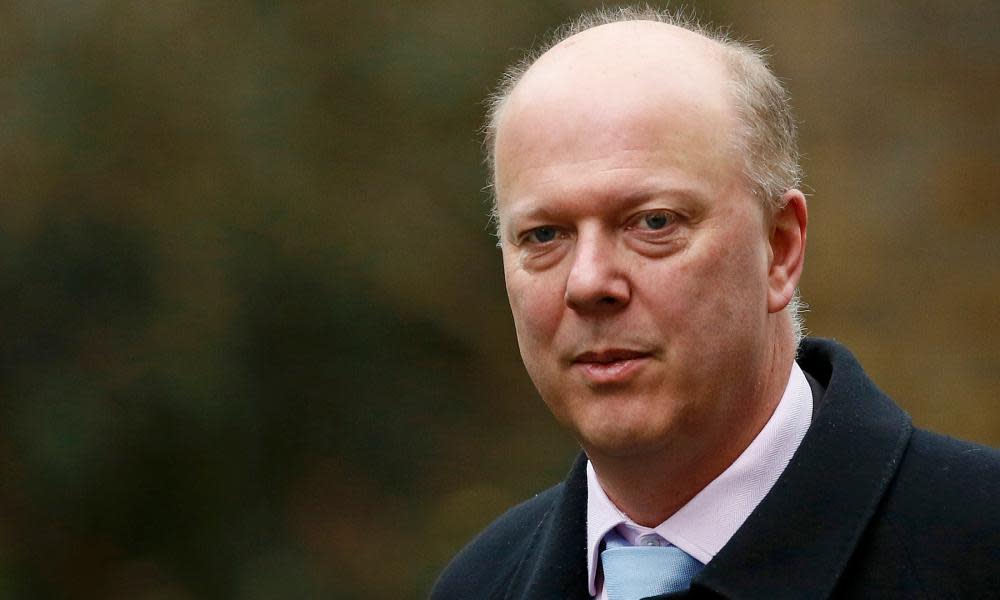Chris Grayling’s privatisation of probation service ‘a disaster’

The extent of Chris Grayling’s botched privatisation of the probation service is exposed by research which brands it an “unmitigated disaster” that left the public at greater risk from ex-offenders released from jail.
Probation officers say bigger caseloads and unrealistic targets, ushered in when Grayling was the justice secretary, have meant that they are unable to keep to the same standards as before. More than a third – 36% – of those interviewed as part of the research admit that they regularly cut corners and compromise professional standards to meet targets.
“The privatisation of probation is unprecedented in terms of its scale and scope and it has proven to be something of an unmitigated disaster for professionals,” write Professor Gill Kirton, of Queen Mary University of London, and Dr Cécile Guillaume, of Roehampton University, in the journal Work, Employment and Society, published by the British Sociological Association.
The pair looked at the effects of the government’s privatisation of about half of the probation service in 2015, in which lower-risk offenders were monitored by 21 private companies and the rest left to public sector organisations.
We are not in a position to protect the public, but we will be the scapegoats when tragedies happen
Probation officer
They surveyed almost 1,000 probation officers, and carried out face-to-face research with 100. More than a third said they did not have enough time for their clients. More than half said their targets were unrealistic.
In a typical comment, one probation officer told researchers: “I truly believe that offenders will receive a poorer service and staff will struggle to provide the high level of service they have always given. Consequently, the public will be at risk.”
Another said: “I do not consider that we are in a position to protect the public, but we will be the scapegoats when tragedies happen.”
In their report Kirton and Guillaume said the privatisation had been carried out in the face of “massive opposition from criminal justice experts, senior probation leaders, the unions representing probation workers, and the workers themselves” and with “no meaningful consultation”.
It had created “conveyor belt” conditions in the privatised part of the service that meant officers were having to “compromise what they regarded as professional standards”.
Labour have claimed that Chris Grayling's mistakes have cost the economy and taxpayers over £2.7bn during his time in government. Here are five of Grayling's biggest failings:
B&B gay comments
In 2010 Grayling was forced to apologise after a recording captured him saying that people who ran bed and breakfasts in their homes should have the right to turn away gay couples.
Banning books for prisoners
Grayling introduced a ban on prisoners receiving books from friends or relatives, and limited the number of books each prisoner was able to have in a cell. A high court ruling in December 2015 found that the measure was unlawful and it was subsequently scrapped.
Rail timetable chaos
Grayling was transport secretary when a change to rail timetables caused chaos, leading to the cancellation of thousands of services. More than one in 10 Northern and Thameslink trains were cancelled after the introduction of the new timetables on 20 May 2018. The rail regulator criticised Grayling's DfT for failing to question the industry’s assurances about the risk of disruption.
Seaborne Freight
Grayling was widely mocked after awarding Seaborne Freight a no-deal Brexit ferry contract despite the company not owning any ships and having never previously operated a ferry service. It emerged that Seaborne's website had copied their legal terms and conditions from a pizza delivery service. The contract was cancelled in February 2019. The government subsequently had to agree a new £33m contract with Eurotunnel to settle legal action.
Part-privatisation of probation contracts
Failings by the Ministry of Justice in the part-privatisation of probation services will cost taxpayers at least £171m, according to a National Audit Office (NAO). Under Grayling, in 2013, the ministry created 21 community rehabilitation companies (CRCs) to manage low- and medium-risk offenders with the aim of cutting reoffending rates and costs. The NAO found that while there has been a 2.5% reduction in the proportion of offenders proven to have committed another crime between 2011 and March 2017, the number of offences per reoffender has increased by 22%.
Since the research was carried out, the government has announced plans to bring the probation service fully back into public ownership. The Ministry of Justice said: “We have already announced plans to reform our probation system to better support officers and ensure stringent, enforceable community sentences.
“Our changes will recognise the specialism and value of probation work, while supporting staff to develop the right skills and expertise.
“Our previous reforms extended probation supervision to around 40,000 extra offenders each year – a positive change for public safety – who would have otherwise been unsupervised.”

 Yahoo News
Yahoo News 
